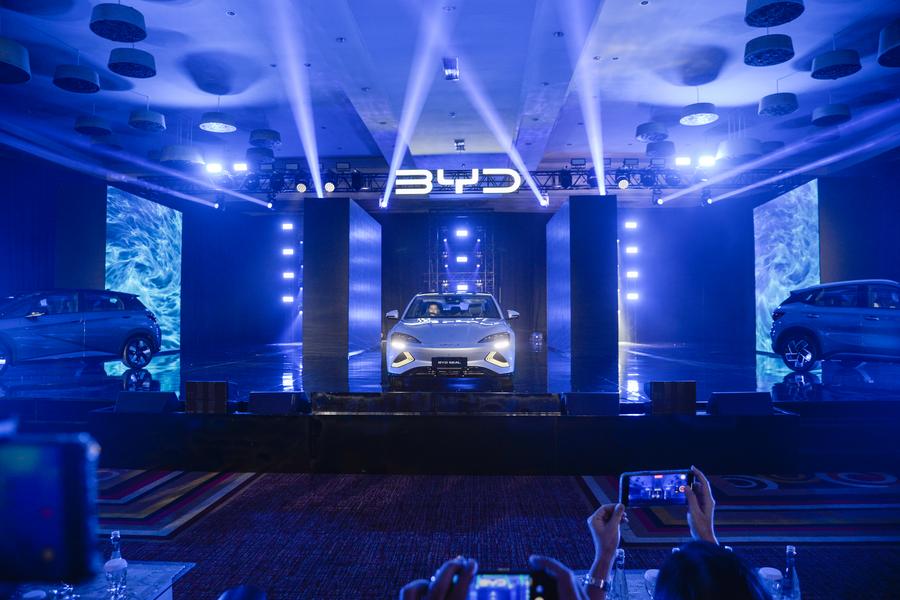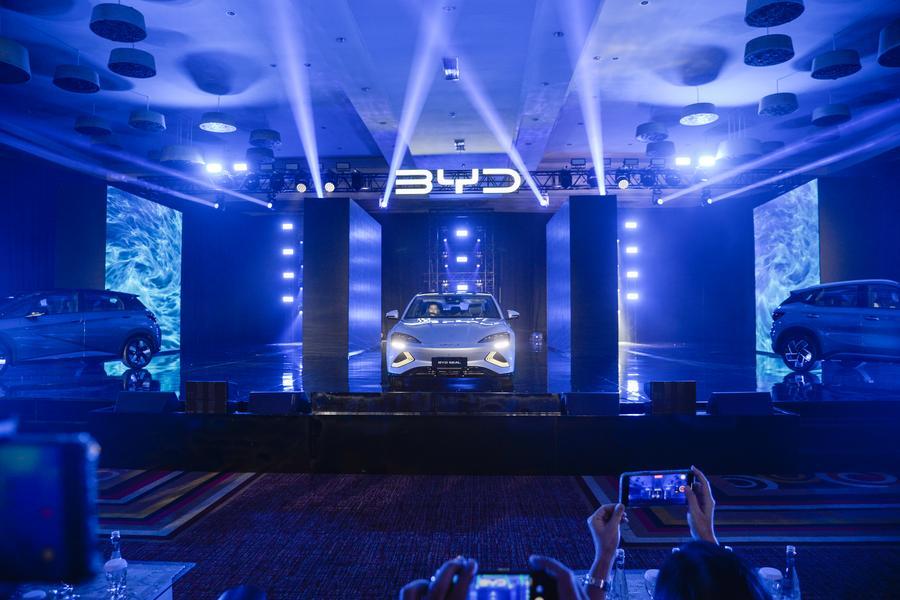
New cars are shown on the stage during BYD grand launch in Jakarta, Indonesia, Jan. 18, 2024. (Xinhua/Xu Qin)
BEIJING, March 13 (Xinhua) -- The production and sales of automobiles in February reached 1.506 million and 1.584 million units, down 37.5 percent and 35.1 percent month on month respectively, data from the China Association of Automobile Manufacturers (CAAM) showed on Monday.
Experts said that due to the impact of the Spring Festival holiday in February, the overall sales volume of the automobile market went down. China's automobile market sees increasingly fierce competition, especially within the new energy passenger vehicle segment priced between 150,000 and 200,000 yuan.
-- High market share of brand passenger vehicles
Some car purchase demands had already been released before the Spring Festival holiday this year, which caused the overall decline of production and sales in the automobile market in February, said Chen Shihua, deputy secretary-general of CAAM.
Despite sales decline, both passenger and commercial vehicles market saw stable operation, and new energy vehicle (NEV) market and automobile exports maintained strong development momentum from January to February, Chen said.
A total of 1.333 million passenger vehicles were sold in February, with a month-on-month decrease of 37 percent and a year-on-year decrease of 19.4 percent. Among them, Chinese brand passenger vehicles sold a total of 791,000 units, down 38.1 percent month on month and 9.4 percent year on year. Market share of Chinese brand passenger vehicles reached 59.4 percent, which was an increase of 6.5 percentage points from the same period last year.
The production and sales of NEV amounted to 464,000 and 477,000 units respectively, with the market share accounting for 30.1 percent.
From January to February, top ten enterprises of automobile sales sold a total of 3.395 million vehicles, accounting for 84.3 percent of the total automobile sales volume.
It is believed that NEV companies may form a relatively stable competitive landscape by 2024, with leading brands more likely to benefit from scale effects. 2024 is a key year for new energy vehicle companies to stabilize their development during the years of rapid growth ahead, and the competition is destined to be very fierce, said Cui Dongshu, the secretary-general of China Passenger Car Association (CPCA).
-- Fierce price competition
From January to February, gasoline-powered passenger vehicles in the 100,000-200,000 yuan and 400,000-500,000 yuan price ranges saw a year-on-year positive growth in sales, with the 150,000-200,000 yuan range experiencing the largest growth rate.
Currently, the sales volume of gasoline-powered passenger vehicles is still mainly concentrated in the 100,000-150,000 yuan range, with a cumulative sales volume of 859,000 units, up 11 percent year on year.
In the NEV market, except for the 200,000-250,000 yuan and 400,000-500,000 yuan price ranges which saw a year-on-year decline in sales, all other price ranges showed positive growth.
Currently, sales are mainly concentrated in the 150,000-200,000 yuan range, with a cumulative sales volume of 296,000 units, up 11.7 percent year on year.
Chen said that the competition in the NEV market for the 150,000-200,000 yuan price range is particularly fierce.
The price competition among NEV companies in 2024 continues to escalate. On Monday, a report from China Securities Journal learned that Nezha Automobile launched a promotion event that buyers of AYA and X models can participate in a draw to win the opportunity to purchase a U-II model at half price.
On March 3, Xiaopeng Motors announced that there would be a time-limited discount of 20,000 yuan on all models of G6 until March 31, with the discounted starting price at 189,900 yuan. In March, Geely launched a 2 billion yuan time-limited subsidy, along with a maximum time-limited cash gift of 47,000 yuan and a maximum trade-in subsidy of 10,000 yuan.
GAC Aion's car model AION Y Plus has been launched with a price of 99,800 yuan, which is a reduction of 20,000 yuan compared to the older model's starting price. On March 1, Tesla China announced a time-limited offer for its two main models, the Model 3 and Model Y, with a price reduction ranging from 8,000 to 16,600 yuan. This marks Tesla's third price cut in Chinese mainland this year.
Since late February, nearly ten automakers have successively reduced the prices of their models, with the highest reduction approaching 15 percent. Both the BYD's models Qin PLUS and Destroyer 05 have seen a price drop of 20,000 yuan, bringing the starting price down to 79,800 yuan.
-- New wave of growth opportunities
Experts said that NEV manufactures' measures of price reduction showcased their determination to compete directly with gasoline-powered vehicle automakers.
He Xiaopeng, CEO of Xiaopeng Motors, said that this year marks the first year of fierce competition for Chinese automotive brands and the start of an elimination round. Gu Jiayue, CEO of Geely, also stated that 2024 will be the most intense year for the car market.
With the increase in the number of NEV models in the main price range of 150,000-200,000 yuan for plug-in hybrids and 200,000-250,000 yuan for pure electric vehicles, market competition is expected to intensify further, according to Everbright Securities.
Some experts believe that price reduction should not be the only way out for car companies.
Feng Xingya, General Manager of GAC Group, expressed that while price promotion is an inevitable result of market competition, reasonable and orderly price competition can stimulate market vitality to a certain extent. But disorderly and blind price cuts can also squeeze the profit margins of companies and harm the interests of car owners.
The development of technologies such as intelligent driving may bring new profit growth points to car manufacturers.
Meanwhile, some authorities proposed to promote a new round of large-scale equipment upgrades and encourage the replacement of old cars and household appliances with new ones. The automotive industry is expected to welcome a new round of consumption stimulus policies, further strengthening growth expectations for the car market, according to Southwest Securities.
In terms of car replacement, Cinda Securities chief analyst Lu Jiamin believes that the new round of trade-in programs is expected to increase the replacement ratio. Sales volumes in the 150,000-300,000 yuan price range are expected to grow, and car manufacturers with a diverse range of multipurpose vehicle models are likely to benefit.
(Edited by Tian Shenyoujia with Xinhua Silk Road, tianshenyoga0524@163.com)




 A single purchase
A single purchase









